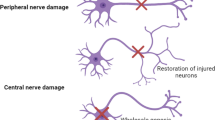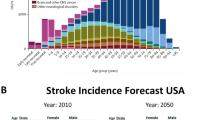Abstract
The cerebellum plays a critical role in promoting learning of new motor tasks, which is an essential function for motor recovery. Repetitive transcranial magnetic stimulation (rTMS) of the cerebellum can be used to enhance learning. In this study, we investigated the effects of cerebellar intermittent theta burst stimulation (c-iTBS), a high-frequency rTMS protocol, on visuo-motor learning in a sample of hemiparetic patients due to recent stroke in the territory of the contralateral middle cerebral artery. Eight stroke patients were enrolled for the purposes of the study in the chronic stage of recovery (i.e., at least 6 months after stroke). In two sessions, Patients were randomly assigned to treatment with real or sham c-iTBS applied over the cerebellar hemisphere ipsilateral to the affected body side. c-iTBS was applied immediately before the learning phase of a visuo-motor adaptation task. Real, but not sham, c-iTBS improved visuo-motor learning as revealed by an increased performance in of the learning phase of the visuo-moto adaptation task. Moreover, we also found that real but not sham c-iTBS induced a sustained improvement in the re-adaptation of the recently learned skill (i.e., when patients were re-tested after 30 min). Taken together, these data point to c-iTBS as a potential novel strategy to promote motor learning in patients with stroke.


Similar content being viewed by others
Abbreviations
- TBS:
-
Theta burst stimulation
- VAT:
-
Visuo-motor adaptation task
- iTBS:
-
Intermittent theta burst stimulation
- cTBS:
-
Continuous theta burst stimulation
- TMS:
-
Transcranial magnetic stimulation
- LTP:
-
Long-term potentiation
- LTD:
-
Long-term depression
- CTC:
-
Cerebello-thalamo-cortical network
- AMT:
-
Active motor threshold
- RMT:
-
Resting motor threshold
- EEG:
-
Electroencephalography
- TEP:
-
TMS-evoked potential
- TRSP:
-
TMS-related spectral perturbation.
References
Rehme AK, Volz LJ, Feis DL, Eickhoff SB, Fink GR, Grefkes C. Individual prediction of chronic motor outcome in the acute post-stroke stage: behavioral parameters versus functional imaging. Hum Brain Mapp. 2015 Nov;36(11):4553–65.
Galea JM, Vazquez A, Pasricha N, Orban de Xivry JJ, Celnik P. Dissociating the roles of the cerebellum and motor cortex during adaptive learning: the motor cortex retains what the cerebellum learns. Cereb Cortex. 2010;21(8):1761–70.
Jayaram G, Tang B, Pallegadda R, Vasudevan EV, Celnik P, Bastian A. Modulating locomotor adaptation with cerebellar stimulation. J neurophysiology. 2012;107(11):2950–7.
Huang YZ, Edwards MJ, Rounis E, Bhatia KP, Rothwell JC. Theta burst stimulation of the human motor cortex. Neuron. 2005;45(2):201–6.
Koch G, Mori F, Marconi B, Codecà C, Pecchioli C, Salerno S, et al. Changes in intracortical circuits of the human motor cortex following theta burst stimulation of the lateral cerebellum. Clin Neurophysiol. 2008;119(11):2559–69.
Bonnì S, Ponzo V, Caltagirone C, Koch G. Cerebellar theta burst stimulation in stroke patients with ataxia. Funct Neurol. 2014;29(1):41–5.
Casula EP, Pellicciari MC, Ponzo V, Bassi MS, Veniero D, Caltagirone C, et al. Cerebellar theta burst stimulation modulates the neural activity of interconnected parietal and motor areas. Sci Rep. 2016 Oct 31;6:36191. https://doi.org/10.1038/srep36191
Rastogi A, Cash R, Dunlop K, Vesia M, Kucyi A, Ghahremani A, et al. Modulation of cognitive cerebello-cerebral functional connectivity by lateral cerebellar continuous theta burst stimulation. NeuroImage. 2017;158:48–57.
Popa T, Russo M, Meunier S. Long-lasting inhibition of cerebellar output. Brain stimul. 2010;3(3):161–9.
Koch G, Esposito R, Motta C, Casula EP, Di Lorenzo F, Bonnì S, et al. Improving visuo-motor learning with cerebellar theta burst stimulation: behavioral and neurophysiological evidence. Neuroimage. 2020;208:116424.
Park HJ, Furmaga H, Cooperrider J, Gale JT, Baker KB, Machado AG. Modulation of cortical motor evoked potential after stroke during electrical stimulation of the lateral cerebellar nucleus. Brain Stimul. 2015;8(6):1043–8.
D’Angelo E. The organization of plasticity in the cerebellar cortex: from synapses to control. Prog Brain Res. 2014;210:31–58.
Ugawa Y, Uesaka Y, Terao Y, Hanajima R, Kanazawa I. Magnetic stimulation over the cerebellum in humans. Ann Neurol. 1995;37(6):703–13.
Reis J, Swayne OB, Vandermeeren Y, Camus M, Dimyan MA, Harris-Love M, et al. Contribution of transcranial magnetic stimulation to the understanding of cortical mechanisms involved in motor control. J Physiol. 2008;586(2):325–51.
Strick PL, Dum RP, Fiez JA. Cerebellum and nonmotor function. Annu Rev Neurosci. 2009;32:413–34.
Koch G, Bonnì S, Casula EP, Iosa M, Paolucci S, Pellicciari MC, et al. Effect of cerebellar stimulation on gait and balance recovery in patients with hemiparetic stroke: a randomized clinical trial. JAMA Neurol. 2019 Feb 1;76(2):170–8.
Acknowledgements
The authors thank all the study participants and their families.
Funding
This work was supported by grant of the Italian Ministry of Health (grant number GR-2013-02358852 to SB and MCP).
Author information
Authors and Affiliations
Corresponding author
Ethics declarations
This study was approved by the local Institutional Review Board and conducted according to the Declaration of Helsinki. All subjects provided written informed consent.
Conflict of Interest
The authors declare that they have no conflicts of interest.
Additional information
Publisher’s Note
Springer Nature remains neutral with regard to jurisdictional claims in published maps and institutional affiliations.
Rights and permissions
About this article
Cite this article
Bonnì, S., Motta, C., Pellicciari, M.C. et al. Intermittent Cerebellar Theta Burst Stimulation Improves Visuo-motor Learning in Stroke Patients: a Pilot Study. Cerebellum 19, 739–743 (2020). https://doi.org/10.1007/s12311-020-01146-2
Published:
Issue Date:
DOI: https://doi.org/10.1007/s12311-020-01146-2




